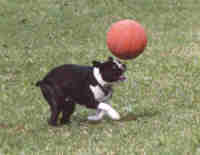The Fog of War
“The Fog of War: Eleven Lessons from the Life of Robert S. McNamara,” was filmed when Secretary McNamara was eighty-six years old. (2003)
Robert Strange McNamara, Secretary of Defense under Presidents Kennedy
and Johnson
General Curtis Emerson LeMay, Air Force Chief of Staff
“At my age, 85, I’m at age where I can look back and derive some
conclusions about my actions. My rule has been try to learn, try to
understand what happened. Develop the lessons and pass them on.”
“In the first message, Khrushchev said this: ‘We and you ought not to
pull on the ends of a rope which you have tied the knots of war. Because
the more the two of us pull, the tighter the knot will be tied. And then
it will be necessary to cut that knot, and what that would mean is not
for me to explain to you. I have participated in two wars and know that
war ends when it has rolled through cities and villages, everywhere
sowing death and destruction. For such is the logic of war. If people do
not display wisdom, they will clash like blind moles and then mutual
annihilation will commence.’
“I want to say, and this is very important: at the end we lucked out. It
was luck that prevented nuclear war. We came that close to nuclear war
at the end. Rational individuals: Kennedy was rational; Khrushchev was
rational; Castro was rational. Rational individuals came that close to
total destruction of their societies. And that danger exists today.”
“I was on the island of Guam in his command in March of 1945. In that
single night, we burned to death 100,000 Japanese civilians in Tokyo:
men, women, and children.
“Well, I was part of a mechanism that in a sense recommended it. I
analyzed bombing operations, and how to make them more efficient. i.e.
Not more efficient in the sense of killing more, but more efficient in
weakening the adversary. I wrote one report analyzing the efficiency of
the B-29 operations. The B-29 could get above the fighter aircraft and
above the air defense, so the loss rate would be much less. The problem
was the accuracy was also much less. Now I don’t want to suggest that it
was my report that led to, I’ll call it, the firebombing. It isn’t that
I’m trying to absolve myself of blame. I don’t want to suggest that it
was I who put in LeMay’s mind that his operations were totally
inefficient and had to be drastically changed. But, anyhow, that’s what
he did. He took the B-29s down to 5,000 feet and he decided to bomb with
firebombs.
“Why was it necessary to drop the nuclear bomb if LeMay was burning up
Japan? And he went on from Tokyo to firebomb other cities. 58% of
Yokohama. Yokohama is roughly the size of Cleveland. 58% of Cleveland
destroyed. Tokyo is roughly the size of New York. 51% percent of New
York destroyed. 99% of the equivalent of Chattanooga, which was Toyama.
40% of the equivalent of Los Angeles, which was Nagoya. This was all
done before the dropping of the nuclear bomb, which by the way was
dropped by LeMay’s command. Proportionality should be a guideline in
war. Killing 50% to 90% of the people of 67 Japanese cities and then
bombing them with two nuclear bombs is not proportional, in the minds of
some people, to the objectives we were trying to achieve.
“LeMay said, ‘If we’d lost the war, we’d all have been prosecuted as war
criminals.’ And I think he’s right. He, and I’d say I, were behaving as
war criminals. LeMay recognized that what he was doing would be thought
immoral if his side had lost. But what makes it immoral if you lose and
not immoral if you win?”
“We all make mistakes. We know we make mistakes. I don’t know any
military commander, who is honest, who would say he has not made a
mistake. There’s a wonderful phrase: ‘the fog of war.’ What ‘the fog of
war’ means is: war is so complex it’s beyond the ability of the human
mind to comprehend all the variables. Our judgment, our understanding,
are not adequate. And we kill people unnecessarily.”
